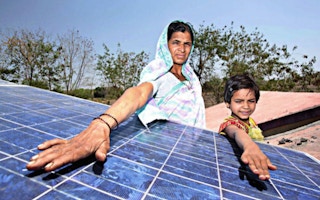Indian clean-energy companies that claim manufacturers in the U.S. and China dumped solar cells below cost on the market are seeking to extend their case to include imports from Europe and Japan.
Indosolar Ltd, Jupiter Solar Power Ltd and Websol Energy System Ltd have filed a new petition to request that duties be imposed on shipments from the European Union and Japan, S. Venkataramani, chief executive officer of Indosolar, said in an e-mailed response to questions about the case’s first hearing held this week in New Delhi.
India joins a trade dispute among the world’s biggest economies as they fight to protect their solar companies amid a global glut of supplies that has resulted in a crash in prices. Solar equipment plants have been idled in the South Asian nation slowing the government’s plans to triple manufacturing capacity by 2020.
The initial case relates to imports from the U.S., China, Taiwan and Malaysia. The hearing drew officials from those countries whose solar-cell and solar-panel makers could potentially face duties, such as First Solar Inc. (FSLR) and JA Solar Holdings Co, as well as dozens of representatives from the local industry.
J.S. Deepak, the Commerce Ministry official handling the case, didn’t answer five phone calls and two e-mails seeking comment.
Duties, tariffs
Indosolar, Jupiter and Websol allege that foreign competitors sold solar products below the market price in India. They calculate the damage inflicted on their industry at as much as twice the cost of imports from January 2011 to June 2012. They’re asking the government for duties, both retroactive and current, as well as tariffs on thin-film solar modules.
All parties must submit written statements by July 25, and defendants have until August 2 to respond, said Jagdish Agarwal, secretary of the Solar Independent Power Producers Association, who attended the proceedings. The government is due to decide whether to impose tariffs or drop the case by the end of August.
The petition is also being opposed by local solar project developers, who would see their cost of materials increase should the allegations be upheld. They argue that Indian manufacturers don’t meet quality and capacity demands, said Agarwal of SIPPA, whose members include at least 10 developers.
Under World Trade Organization rules, petitioners must have at least a 25 percent share of the market to open a case. In India, estimates of market size aren’t reliable and it’s unclear whether the three petitioners meet these criteria, Agarwal said.
China set tariffs of as much as 57 percent on polysilicon shipped from the U.S. and South Korea this week. The U.S. itself imposed tariffs of as much as 250 percent on Chinese solar panels last year after a drop in prices led to bankruptcies. The European Union set preliminary duties of 11.8 percent on Chinese modules, which may jump to 67.9 percent if a deal isn’t reached.

















